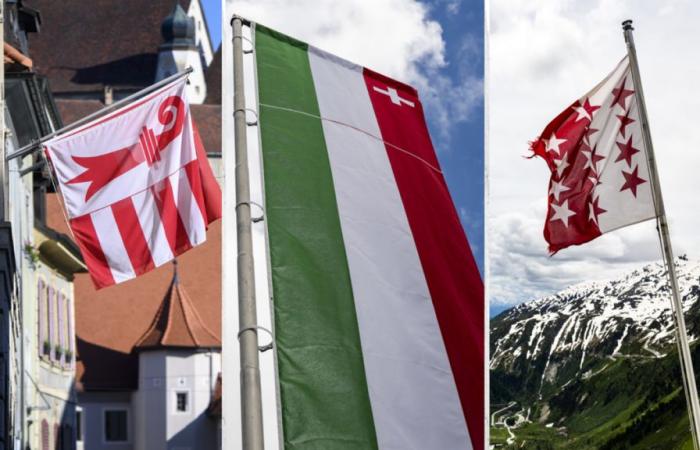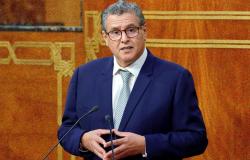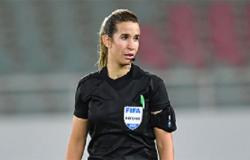Image: Keystone
Valais, Neuchâtel, Geneva and Jura are renewing their authorities next year. Here is the program.
More from “International”
Four French-speaking cantons will be called to the polls next year for cantonal elections. The Valais residents will be the first to renew their political authorities at the beginning of March. The Jura residents will speak last, for a vote of an unprecedented nature.
On the French side, Valais will open fire on March 2, with a second round scheduled for March 23. Two state councilors chose not to run again: the centrist Roberto Schmidt and the PLR Frédéric Favre. Both will have spent eight years in government.
The three other outgoing candidates, Christophe Darbellay (Center), Mathias Reynard (PS) and Franz Ruppen (UDC), on the other hand, chose to run for a new term.
The PLR has launched Stéphane Ganzer into the race. The president of the commune of Noble-Contrée was preferred to Sonia Tauss-Cornut. A member of the Grand Council since 2009, this teacher’s mission will be to retain the PLR seat in the Valais government.
Deprived of female representation during the 2021-2025 legislature, the Council of State could no longer be 100% malestarting next year. Candidate from the Center du Haut-Valais, Franziska Biner is the big favorite to succeed Roberto Schmidt. Recently elected vice-president of Zermatt, she has served on the Grand Council since 2017.
In the Grand Council, the Center currently has 48 seats, the PLR 27, the UDC 22, the PS 15, the Vert-es 13, the Left Center 4 and Entremont Otherwise 1. During the last elections of 2021, the Center lost seven mandates, the Greens had experienced the largest increase with five additional elected deputies.
Hopes of the left in Neuchâtel
A Neuchâtel, the left hopes to overthrow the majority of the Council of State during the elections of March 23. She relied on an alliance, made up of the two outgoing socialist state councilors Florence Nater and Frédéric Mairy, the state councilor (Vert-es/NE) Céline Vara, Christine Ammann Tschopp (Vert-es) and the popist Sarah Blum.
The right reacted and the PLR will ally itself for the first time in the canton with the UDC and the Center. In addition to the two outgoing Laurent Favre and Crystel Graf, the PLR put Quentin Di Meo in the running. They will be accompanied by the Chaux-de-Fonier UDC municipal councilor Thierry Brechbühler and the Center deputy Manon Freitag.
In addition to these two alliances, the PVL Maxime Rognon and Jessica Muriset and the independent ex-UDC deputy Grégoire Cario will be there. The 2nd round is scheduled for April 13.
UDC and MCG want to confirm in Geneva
In the canton of Geneva, the electoral year will be marked by municipal electionswhich will be held on March 23 for municipal councils and the first round of municipal executives. A possible second round will take place on April 13.
The ballot will make it possible to see if the UDC and the MCG, two parties which made good progress during the cantonal elections of 2023, will be able to confirm the test at the municipal level. The two parties currently do not have any representatives in municipal executives.
It will also be interesting to see how the latest addition to the Geneva political scene, the Freedom and Social Justice (LJS) movement founded by State Councilor Pierre Maudet, will behave. During the cantonal elections in 2023, he obtained ten seats on the Grand Council.
The vote will also be a baptism of fire for this new alliance bringing together The Center and the Vert’liberaux in a certain number of municipalities, as is the case in the City of Geneva.
Unprecedented ballot in the Jura
In Jura, the general elections to elect the five members of the Government and the 60 deputies of Parliament on October 19 will take on an unprecedented dimension. It is not only the citizens of Jura who will go to the polls but also those of the City of Moutierwhich will however only become Jura on January 1, 2026.
Provost citizens will also be able to run for a seat in Parliament or the Government. This is to avoid a too long period without political representation of Moutier. The City and its 7,200 inhabitants will form an electoral constituency with 7 deputies out of 60 in Parliament for the duration of a legislature.
The fight to gain access to the Government promises to be very competitive. The PLR and the UDC want to seize one of the five seats in the executive. The Center, which managed to recover its 2nd seat during the complementary election, will try to maintain its gains, just like the PS.
Also in German-speaking Switzerland
In German-speaking Switzerland, Solothurn residents will elect a new Council of State on March 9, as well as a new cantonal Parliament. Three outgoing ministers, from the PLR, the Center and the PS are standing for re-election. The PLR and the Greens want to defend their respective vacant seats. The UDC hopes to win a seat on the Council of State for the first time. The PS wants to win a second.
In the Grand Council, the UDC, which has only one seat less than the PLR, could become the largest parliamentary group.
In the canton of Appenzell Innerrhoden, all members of the government must stand for re-election each year at the Landsgemeinde at the end of April. So far a vacancy is known.
Added to this are complementary elections: a vacant seat in the government of Outer Rhodes will be filled on February 9. On the same day, voters in the canton of Glarus will choose a PLR state councilor who must leave his post due to the age limit in force in the canton. (ats)






